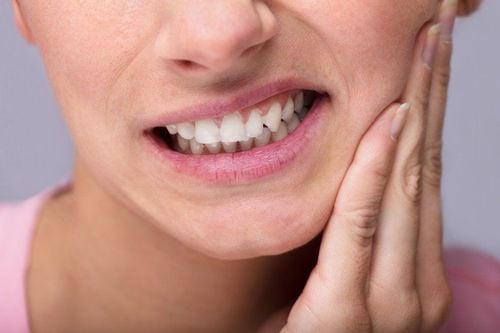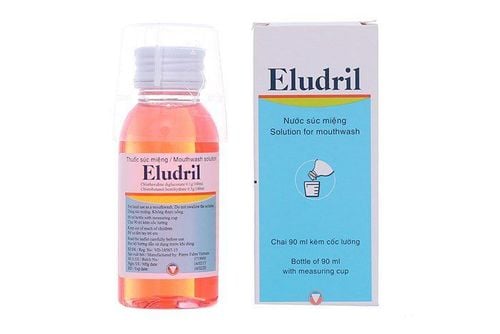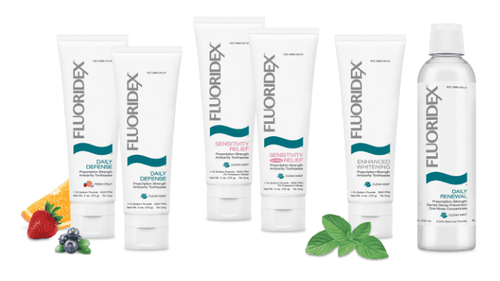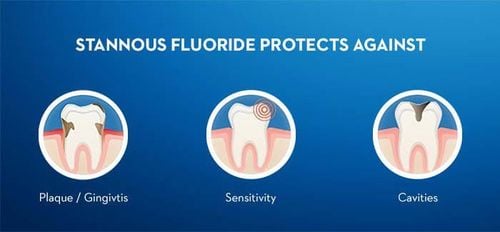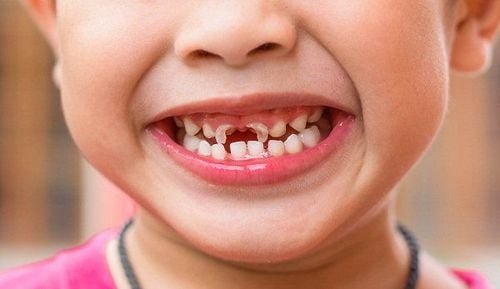This is an automatically translated article.
The article was professionally consulted by Specialist Doctor I Nguyen Trung Hau - Doctor of Odonto-Stomatology - Department of Medical Examination & Internal Medicine - Vinmec Da Nang International General Hospital.Dental hygiene for babies, especially when babies have started eating solid foods, not only limit tooth decay but also help them have healthy and beautiful teeth. Mothers should help children create a habit of cleaning their teeth at least twice a day.
1. Benefits of oral hygiene for 1-year-old children
Cleaning the baby's teeth after each meal and before going to bed right from the first years of life, when the teeth have not yet erupted, helps the baby's future baby teeth. Creating a healthy habit for your baby is regular oral hygiene. This habit will follow the child for the rest of his life. When your baby starts teething, cleaning your baby's teeth helps to remove harmful plaque and bacteria from their teeth. Although at this time, children mainly only drink milk and eat porridge, powder, ... however, plaque can still remain on children's teeth, so it needs to be cleaned.Trắc nghiệm: Sự phát triển tinh thần, vận động của bé thế nào là đúng chuẩn?
Khi nào bé biết nói, biết hóng chuyện hay biết cầm cốc là "đúng chuẩn"? Điểm xem bạn biết được bao nhiêu mốc phát triển tinh thần, vận động "đúng chuẩn" của bé nhé!The following content is prepared under supervision of Thạc sĩ, Bác sĩ y khoa, Ma Văn Thấm , Nhi , Phòng khám Đa khoa Quốc tế Vinmec Dương Đông(Phú Quốc)
2. How to clean teeth for 1-year-old children
The period when the baby has not yet teethed: the mother cleans the baby's teeth by using a gauze or soft cloth dipped in clean warm water, or physiological saline, gently wiping the child's gums once a day. You can incorporate this while bathing your baby. The period when the baby starts teething: the mother uses a soft brush (the type attached to the tip of the finger) and a soft, clean cloth to clean the baby's teeth. Start by dipping the brush in clean water or physiological saline and then thoroughly and thoroughly brush the sides of the teeth as well as the entire gums. Finish by wiping your child's teeth and gums with a soft cloth. When cleaning the baby's teeth, the mother should pay attention to place the bristles towards the gum line about 45 degrees relative to the teeth, gently rotate the brush and brush each group of teeth (about 2-3 teeth), brush all 3 sides. The teeth include the outer, inner, and chewing surfaces. At the beginning, children often do not like toothpaste and often swallow toothpaste. Therefore, when cleaning children's teeth, parents should be careful and need instructions and reminders so that children do not swallow toothpaste. Only a small amount of toothpaste should be used (for children it's only the size of a pea, or parents can also spread a very thin layer on the child's toothbrush). Fluoride in toothpaste will strengthen children's teeth.3. Notes on oral hygiene for children to eat solid foods
Mothers should help children create a habit of cleaning their teeth at least twice a day, after eating and especially before sleeping. When cleaning the baby's teeth, the mother should create a fun atmosphere such as telling stories, playing music, or singing so that the child can enjoy and remember oral hygiene with a happy and comfortable mood. After the baby teething, the mother should give the child a little water to drink after feeding or eating, then wrap a soft, damp gauze or cloth around the finger, gently wipe the teeth (both the outer and inner surfaces of the teeth). and rub gums and tongue for children.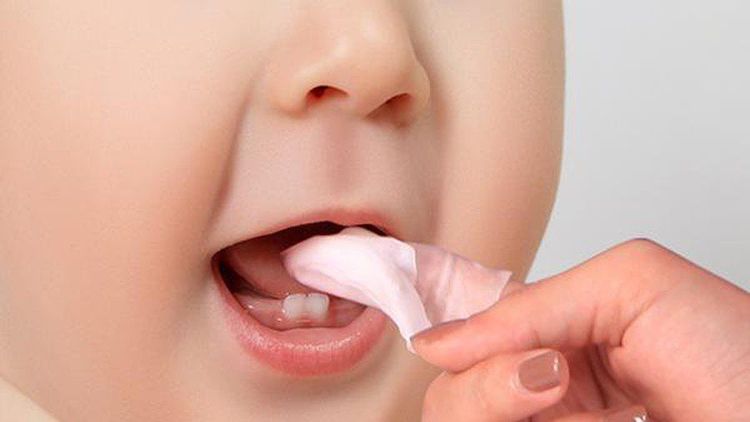
4. Help your baby develop good and healthy teeth
In addition to taking care and cleaning your baby's teeth, mothers also need to pay attention to the following things to help baby's teeth develop and baby have healthy, beautiful teeth.Do not let the baby lie down to drink milk because when the teeth are growing, the baby will have a habit of tightly latching on the nipple. Teeth soaked in milk for a long time are easily deformed and damaged enamel, creating conditions for bacteria to grow and easily cause tooth decay. Do not allow your baby to suck on the tip of his finger or suck on a pacifier, which will cause the teeth to grow unevenly and not in alignment. Do not let the baby chew on one side, it will cause the baby to deviate the jaw, causing an imbalance of the face. Give your baby food with a hardness suitable for the development of teeth so that the baby's teeth develop more comprehensively. Dental care and hygiene for a 1-year-old child is very important and necessary, because it not only stimulates the eruption of baby teeth, but also forms a habit that follows the baby throughout life.
Besides, parents should also let their children go to the dentist regularly at least every 3-6 months to be evaluated by the doctor about the dental condition, helping the baby to have a strong set of teeth.

Please dial HOTLINE for more information or register for an appointment HERE. Download MyVinmec app to make appointments faster and to manage your bookings easily.





